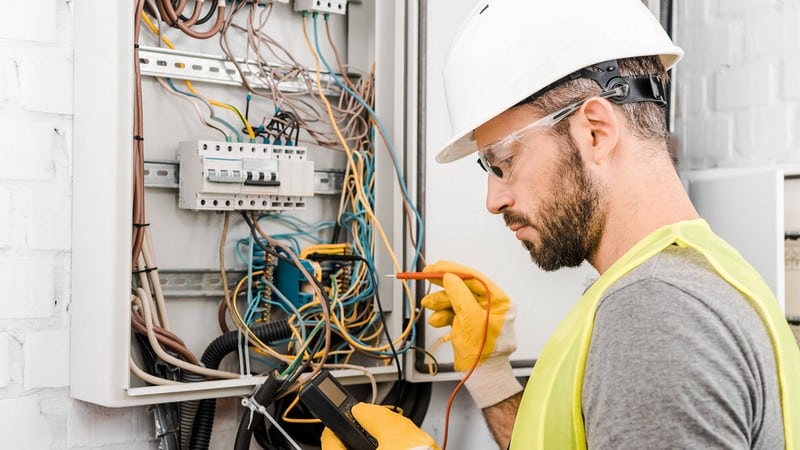
Upgrading your home’s electrical system isn’t just about adding outlets or swapping out an old panel. It’s an investment in safety, efficiency, and peace of mind — especially as modern households demand more power than ever before.
But even well-intentioned homeowners can miss key details when planning an electrical upgrade. Whether you’re prepping for a renovation, installing a home EV charger, or just trying to stop the lights from flickering, here are some commonly overlooked factors to keep in mind.
1. Your Electrical Panel Might Be Holding You Back
Many homes still run on outdated 100-amp panels — fine decades ago, but often underpowered for today’s tech-filled lifestyles. If you’re noticing tripped breakers or dimming lights when major appliances run, your panel may be overwhelmed.
A panel upgrade isn’t just about adding more circuits. It’s about ensuring your system can safely and reliably handle the load of your modern home, from HVAC to kitchen appliances to electric vehicle charging.
Upgrading your electrical panel often reveals hidden issues like undersized service lines or ungrounded systems that need to be addressed for full safety compliance.
2. Not All “Upgrades” Are Future-Proof
It’s tempting to only fix what’s broken — but that approach can cost more down the line. If you’re already hiring an electrician for one project, it’s often worth asking what else might be smart to tackle while they’re there.
Consider:
- Installing dedicated circuits for future upgrades (like a hot tub or home office)
- Adding surge protection for sensitive electronics
- Pre-wiring for solar, EV charging, or a standby generator
- Replacing aluminum wiring or knob-and-tube, which can be fire hazards
A good electrician will walk you through what’s essential now versus what you can plan for.
3. Code Requirements Change More Than You Think
Local and national electrical codes are constantly evolving — and what was acceptable ten years ago might not pass inspection today. If you’re renovating or selling your home, failing to meet updated code could delay the process or trigger costly rework.
Even something as simple as outlet spacing or GFCI protection in kitchens and bathrooms can trip you up if you’re not careful. That’s why it pays to hire a certified electrician, or your local area who stays current with the latest safety standards.
4. The Small Stuff Matters More Than You Think
It’s easy to focus on the big upgrades and forget about the small conveniences that impact daily life:
- Where do you plug in your phone at night?
- Do your kitchen appliances overload one outlet?
- Are your outdoor lights on timers or switches?
- Is your workspace lit well enough for long hours?
Well-planned electrical work should improve how your home feels to live in. Ask your electrician about ways to streamline or customize your setup to better fit your lifestyle.
Electrical upgrades aren’t just technical — they’re personal. The best pros take the time to understand how you actually use your home and make sure the upgrades truly serve you.
A great example is Deshaies Electrical, a certified electrician in Crofton MD known for clean work, honest communication, and consistently high-quality residential service. Whether you’re planning a full electrical panel replacement in Crofton MD or tackling a few upgrades, working with a trusted expert makes all the difference.
Thinking about an upgrade? Start by asking the right questions — and working with someone who asks the right ones, too.
In the second half of this guide, we’ll walk through how to prepare for an electrical upgrade, from budgeting to scheduling and what to expect on install day…
How to Prepare for an Electrical Upgrade
Once you’ve decided it’s time to upgrade your electrical system, a little preparation goes a long way. Here’s how to make the process smoother — and avoid common delays or surprises.
1. Know What You’re Solving For
Start by clarifying why you’re upgrading. Are you:
- Renovating or adding square footage?
- Dealing with overloaded circuits or tripping breakers?
- Prepping for an EV charger, hot tub, or backup generator?
- Concerned about safety or insurance compliance?
Knowing your goals will help your electrician recommend the right scope — and avoid unnecessary costs.
2. Get a Walkthrough (Not Just a Quote)
A qualified electrician should offer more than a number — they should take time to walk through your home, ask questions, and point out opportunities you may not have considered. This is especially important for older homes, where existing wiring or panels might not meet current code.
During your walkthrough, don’t be afraid to ask:
- “Is my current panel large enough?”
- “What would you recommend for future-proofing?”
- “Are there any safety concerns you see here?”
The right pro will give you clear answers, not scare tactics or upsells.
3. Plan for Power Downtime
Depending on the scope of your upgrade, you may need to go without power for several hours — or even a full day. Your electrician should walk you through how long the work will take and whether you’ll need to coordinate with your utility provider.
If possible, schedule your project on a day when you’re not working from home or relying heavily on Wi-Fi and appliances.
4. Budget Beyond the Basics
The cost of an electrical upgrade can vary depending on the size of your home, the condition of existing wiring, and your location. But here are a few extras homeowners often forget to factor in:
- Permit fees (required in most areas for panel replacements or major work)
- Wall patching or paint touch-ups if access holes are needed
- Upgraded fixtures or smart home devices you may want to install during the job.
A good electrician will be upfront about these potential add-ons so there are no surprises later.
A Safer, Smarter Home Starts with the Right Partner
When it comes to electrical upgrades, choosing the right professional matters as much as the equipment itself. Look for licensed, insured electricians with strong local reputations and clear communication from the first call.
Whether you’re planning a full electrical panel replacement, adding new lighting, or just making sure your system is up to code, a knowledgeable pro will help you prioritize what matters — and do the job right the first time. The electrical system is the hidden engine of your home. Take care of it, and it will take care of you for decades to come.
Need help getting started? Talk to a trusted local electrician to assess your options and build a plan that fits your home, timeline, and budget.








